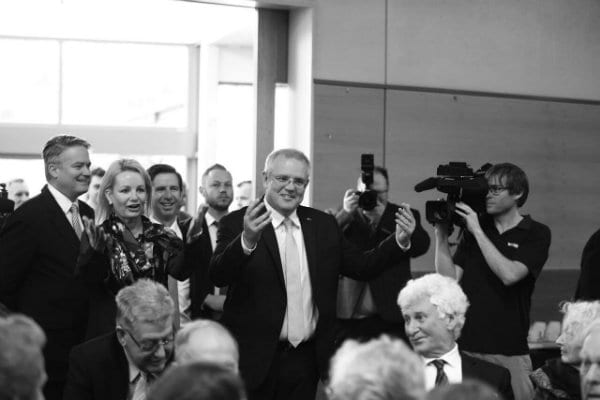A public commitment by this particular group is not nothing. The goal might not be guaranteed by virtue of it being identified by this congregation of world leaders but the fact an issue has been specifically highlighted is an indicator that it’s taken seriously.
At every subsequent G20 Summit since Brisbane the commitment has been reaffirmed.
According to the World Economic Forum Australia ranks 54th out of 149 nations when it comes to women’s workforce participation, so it’s fair to say the task of narrowing the gap for women at work and meeting the stated G20 goal is significant.
Yet it’s difficult to identify a single meaningful policy change or initiative that has been implemented or introduced since 2014 that would help in this endeavour.
To the contrary, consider a few revelations from Senate Estimates on Monday of this week. Representatives from both the Workplace Gender Equality Agency and the Office for Women were present and a few things stuck out.
- It’s been 18 months since a Prime Minister met with the Office for Women.
When Greens Senator Larissa Waters asked Trish Bergin, First Assistant Secretary at the Office for Women whether they had met this was the exchange:
Senator WATERS: Has the Prime Minister met with the Office for Women since he assumed the role?
Ms Bergin: No.
Senator WATERS: Have previous Prime Ministers met with the Office for Women?
Ms Bergin: I would have to take that on notice. I’ve been in the role for 18 months, so it’s not in my time.
Senator WATERS: Given that we’ve got an epidemic of violence against women—69 women were killed last year —would you be seeking a meeting with the Prime Minister, or is that something you would wait for the Prime Minister to initiate?
Ms Bergin: We do have a very close working relationship with the Prime Minister’s office. There is a particular adviser that we work very closely with and whom we—yes, we work very closely with that office.
Senator WATERS: But not with the Prime Minister himself?
Ms Bergin: Not to date, no.
- The provision of paid parental leave by employers in Australia has stalled.
The WGEA Director Libby Lyons said that over the period the agency has collected data, the provision of paid parental leave by employers has stalled. Paid parental leave is a key policy lever in terms of women’s workforce participation because of the role it plays in facilitating parents’ ability to combine work and family obligations
- The technology relied upon by the Workplace Gender Equality Agency, to collect and analyse data from more than 10,000 employers will reach “the end of its useful life” at the end of this month.
The $8.1 million investment which is required to ensure the agency can collect the data as required has not yet been mapped out. And yet overnight the Prime Minister was able to announce half a billion of funding to open a medical centre on Christmas Island.
- The Women’s Economic Statement, delivered in November of 2018 by the Minister for Women Kelly O’Dwyer, requires at least three different legislative changes to be effected.
Normally the Office of Women would be asked to create, draft or review this type of legislative change and that hasn’t even begun. It was confirmed there is no timetable for legislation to effect these changes.
- There is no appetite to re-introduce the women’s budget impact statement after the then-PM Tony Abbott axed it in 2014.
Since 2014 the NFAW has voluntarily undertaken the task of analysing the budget through a gender lens. The fact women’s free labour is the only reason we have known what the impact of various budgetary measures is on women is telling.
- WGEA doesn’t have the resources to review the content of the gender equality plans that must be developed and submitted by employers with over 500 staff.
The fact there is effectively no quality assurance means the plans submitted by employers cannot be verified. If this exercise isn’t simply a compliance box to tick, and rather is viewed as an enabler of workplace equality, the agency needs to be funded to provide oversight.
It is no secret that the issue of women is – finally – front and centre in Australian politics and it’s a particularly big issue for the coalition. It is clear that when it comes to meaningful change towards gender equality – both in and out of Canberra – this government hasn’t just checked out. It’s never been in.
In Kelly O’Dwyer the government had a Minister for Women committed to the portfolio – but the damage done by the wilful disinterest of Tony Abbott and Michaelia Cash was done. And without the full support – in dollar terms – of the government O’Dwyer was never free to introduce the types of radical changes necessary to move the dial for women.


